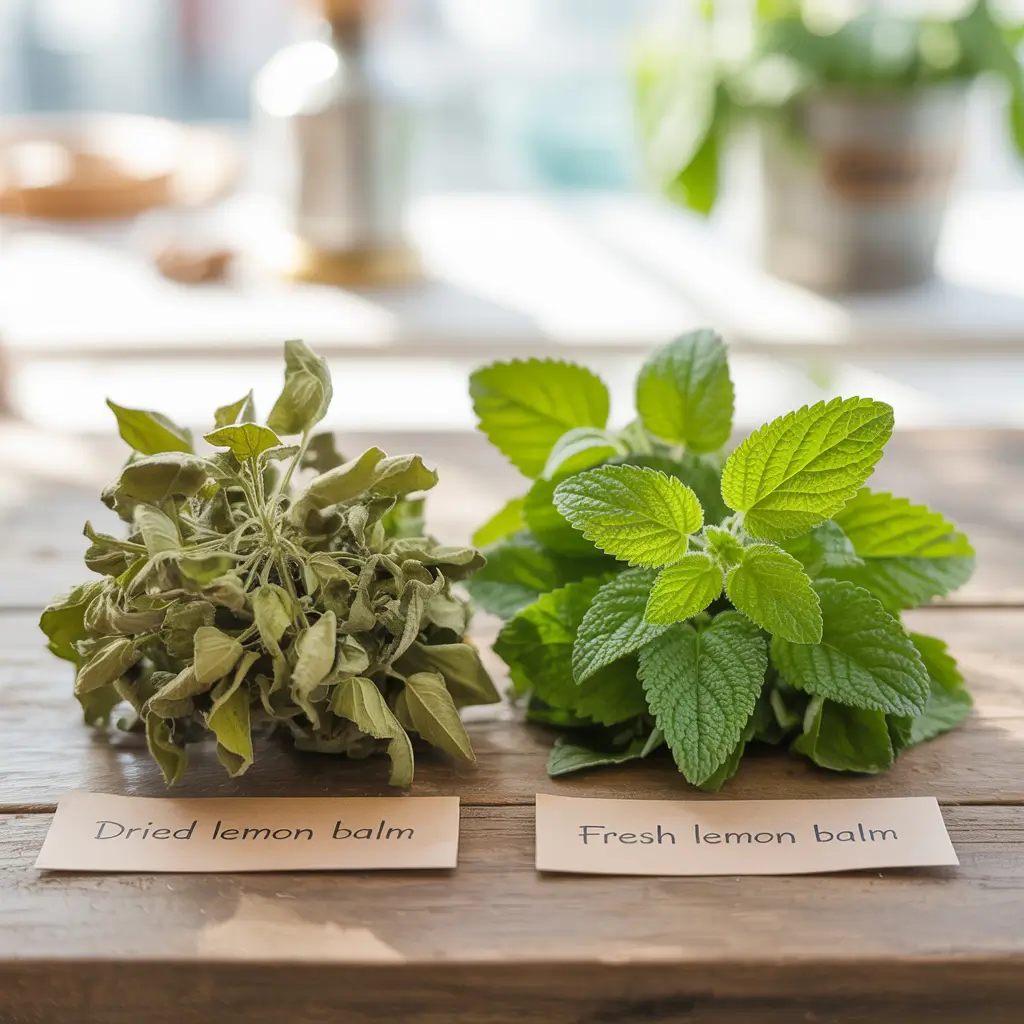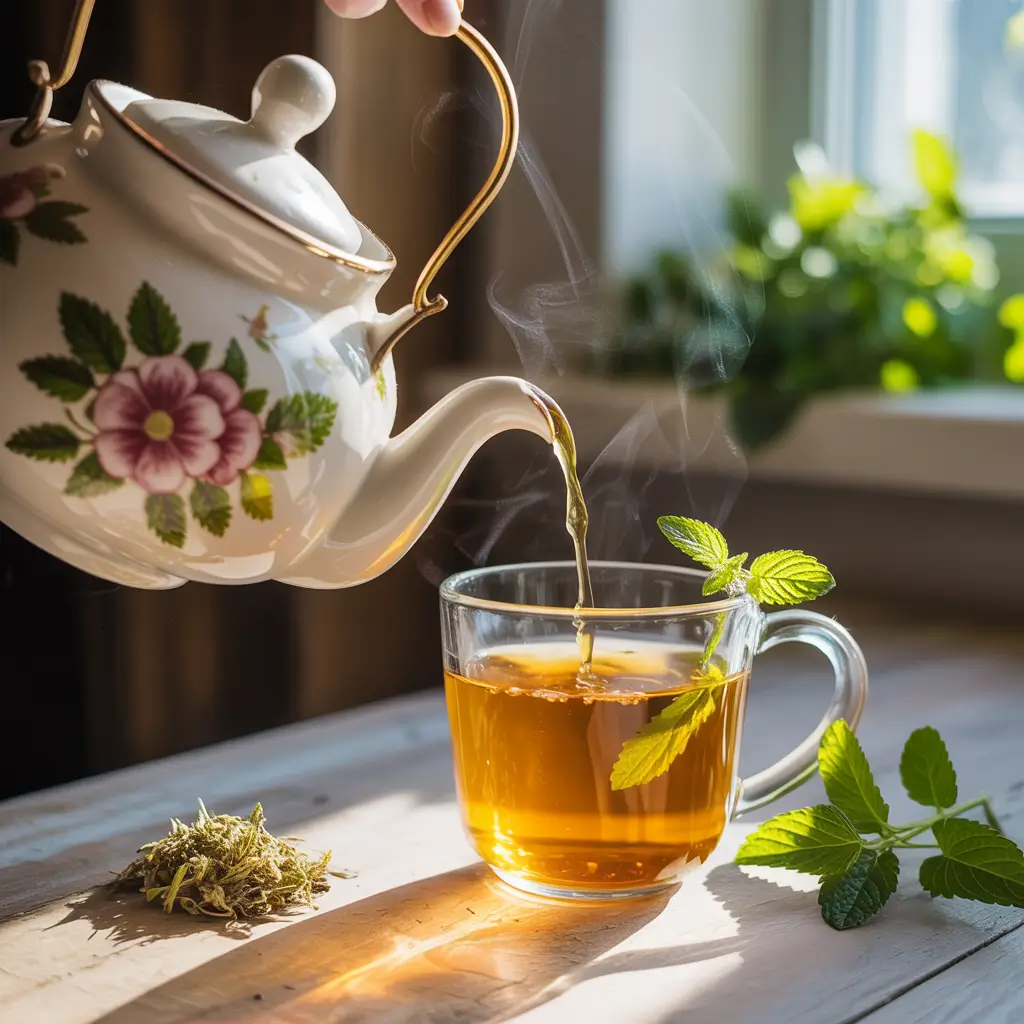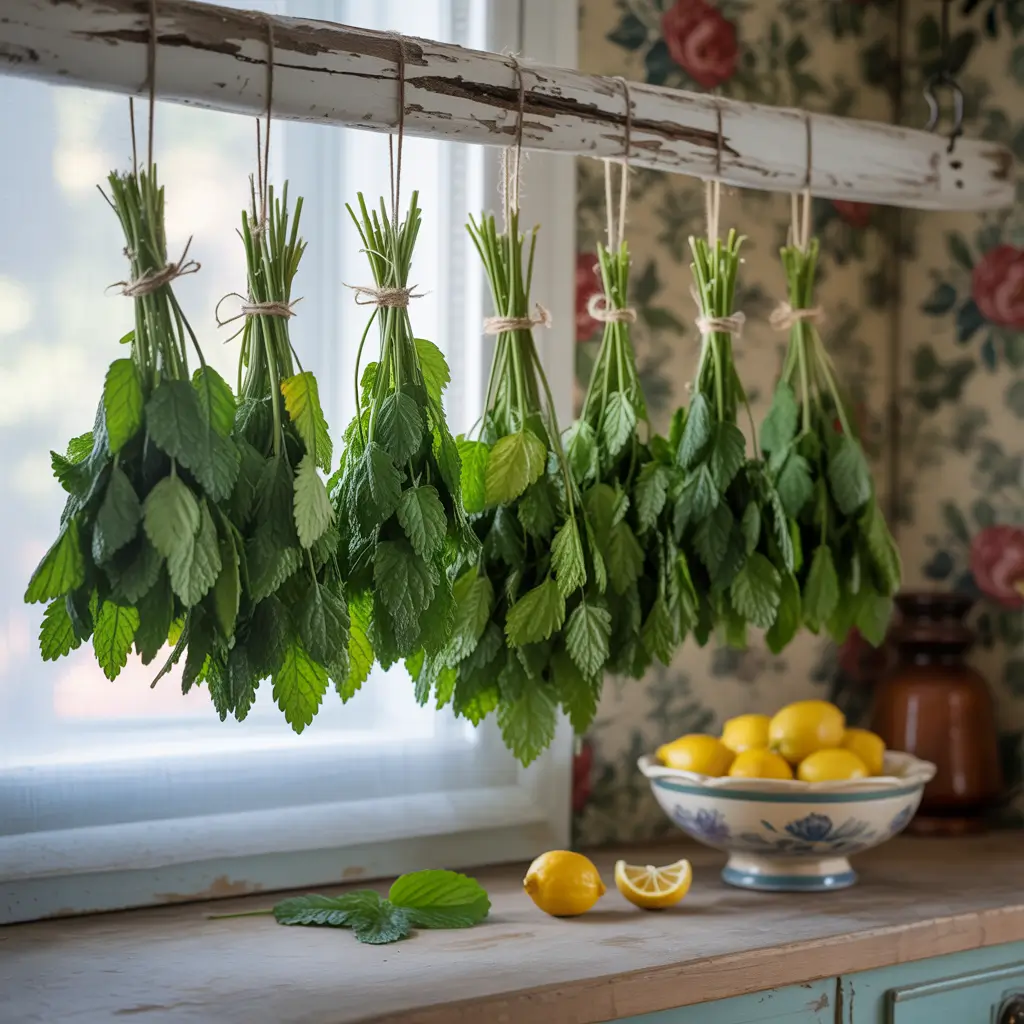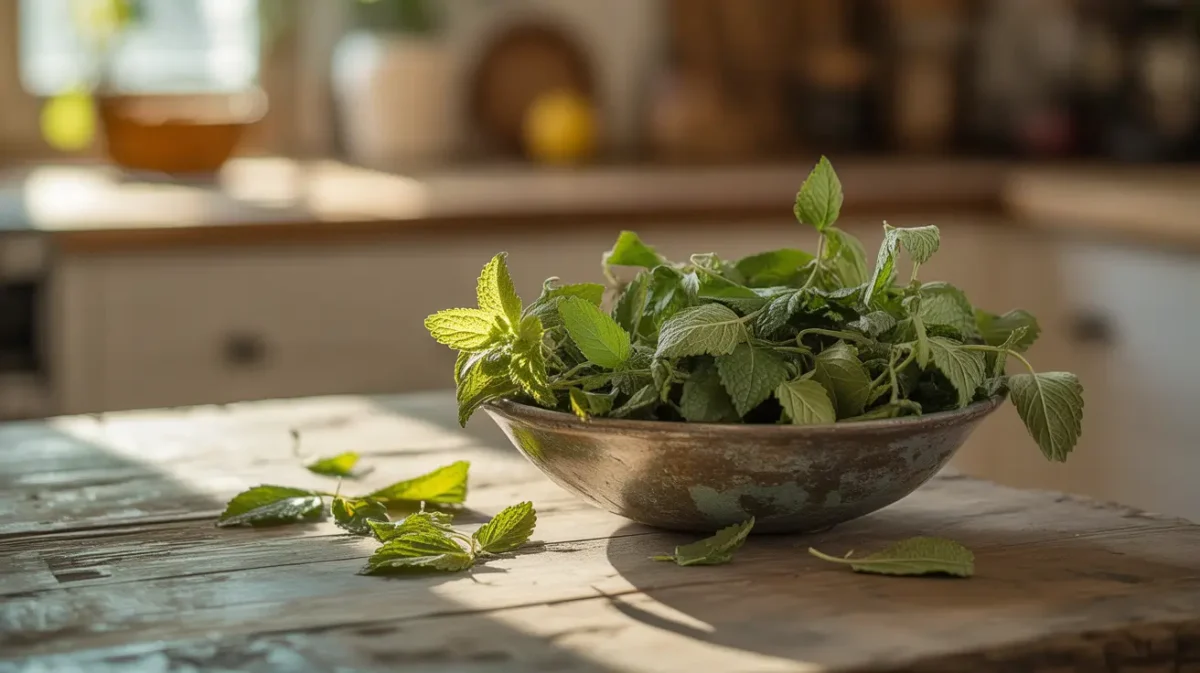introduction
Lemon balm dried herb is a calming, citrus-scented plant used for centuries to ease stress, aid sleep, and support digestion. Whether brewed as tea or used in natural remedies, it’s a versatile addition to any wellness routine.
In this guide, we’ll explore what lemon balm dried herb is, its top health benefits, how to use it, grow it, and store it properly.
Discover great ideas like Vegan Low FODMAP Diet: The Complete Guide to pair with this gentle herbal remedy.
Understanding Lemon Balm Dried Herb
What is Lemon Balm Dried Herb?
Lemon balm dried herb comes from the Melissa officinalis plant, a lemon-scented member of the mint family. Once fresh leaves are harvested, they’re carefully dried to preserve their aroma, flavor, and healing compounds. The result? A shelf-stable herb that’s perfect for tea blends, culinary recipes, and natural health remedies.
Unlike fresh lemon balm, the dried version is more concentrated and lasts much longer. It has a mellow, citrusy taste with a slight mint undertone—ideal for both relaxation and refreshment. From teas that calm the nerves to herbal infusions that ease digestion, this herb packs more than just fragrance.
How is Lemon Balm Dried and Processed?
Drying lemon balm is a delicate process. To retain potency, the leaves are usually harvested just before the plant flowers—when essential oils are at their peak. After rinsing, the leaves are air-dried in a shaded, well-ventilated space or gently dehydrated at low heat.
Once fully dry, they should feel crisp, not brittle, and keep a soft green color. Improper drying can cause the leaves to brown, lose aroma, or develop mold. For best results, lemon balm should be stored in airtight containers, away from heat and light.
If you’re looking for a natural herb that supports both the body and mind, lemon balm dried herb is an excellent place to start.
Health Benefits of Lemon Balm Dried Herb

Key Nutrients and Active Compounds in Dried Lemon Balm
Lemon balm dried herb is rich in beneficial plant compounds that make it a popular choice for natural wellness. Key components include rosmarinic acid, which has anti-inflammatory effects, flavonoids for antioxidant support, and essential oils like citronellal and geraniol, which contribute to its calming properties.
These compounds are preserved during the drying process, making the herb potent and effective even after long storage.
Evidence-Based Health Benefits
Lemon balm has long been used in traditional herbal medicine, and modern studies now support many of its benefits:
- Reduces stress and anxiety: Drinking lemon balm tea can help calm the mind and reduce nervous tension.
- Supports better sleep: Thanks to its natural sedative effects, it’s often included in herbal sleep blends.
- Aids digestion: Lemon balm helps ease indigestion, gas, and bloating by relaxing the digestive tract.
- Boosts focus: Some research suggests it may improve cognitive function and mental clarity without overstimulation.
- Fights oxidative stress: With its antioxidant content, it helps protect the body from cellular damage.
Whether you’re managing stress or looking to improve digestion naturally, lemon balm dried herb is a gentle, effective option to add to your daily routine.
Common Uses of Lemon Balm Dried Herb
What is Dried Lemon Balm Used For?
Lemon balm dried herb is incredibly versatile, offering a wide range of practical uses in everyday life. One of its most popular uses is in herbal teas, especially those aimed at stress relief or sleep support. When steeped, it creates a light, lemony brew that’s both soothing and refreshing.
Beyond tea, dried lemon balm is also used in:
- Natural remedies – infused oils, tinctures, and capsules for anxiety, colds, and mild digestive issues
- Homemade skincare – as an ingredient in balms and salves for its calming and antimicrobial effects
- Fragrance therapy – tuck dried blends into sachets or potpourri bowls to gently scent a room while encouraging a calm, soothing atmosphere.
Its gentle properties make it suitable for both children and adults, which is why it’s often found in family-friendly herbal blends.
Culinary, Medicinal, and Aromatherapy Applications
In the kitchen, dried lemon balm can be used as a seasoning in marinades, dressings, or baked goods. While not as pungent as fresh herbs, it still adds a mild lemony touch to dishes.
For wellness, many people take it as a capsule, make their own lemon balm-infused honey, or include it in DIY herbal bath soaks. In aromatherapy, its dried leaves are used to relieve tension and support mood balance.
From herbal healing to home use, lemon balm dried herb fits naturally into a wellness-focused lifestyle.
How to Make and Use Lemon Balm Tea

How to Brew Dried Lemon Balm Tea the Right Way
One of the easiest and most enjoyable ways to use lemon balm dried herb is by brewing it into a calming herbal tea. This tea is popular for its light citrus flavor and gentle effects on the nervous and digestive systems.
Here’s how to make it:
Ingredients:
1 to 2 teaspoons of dried lemon balm
1 cup of hot water (just below boiling)
Instructions:
Add the dried herb to a tea infuser or loose in a mug.
Pour hot water over the leaves.
Place the lid on and allow it to infuse for about 5–10 minutes.
Strain (if loose) and enjoy warm.
You can add honey, lemon, or a slice of ginger for extra flavor or benefits.
What Happens If I Drink Lemon Balm Tea Every Day?
Drinking lemon balm tea daily can promote a sense of calm, support digestion, and improve sleep quality over time. Many users report feeling more relaxed and less anxious within a week of regular use.
While it’s generally safe, overuse may cause mild side effects like dizziness or stomach upset in sensitive individuals. For best results, drink 1–2 cups per day, preferably in the evening.
Consistent use of lemon balm dried herb tea can become a natural and gentle part of your wellness routine.
Get visual inspiration and herbal how-tos on our Pinterest board — perfect for tea lovers, gardeners, and natural wellness fans.
Cost and Availability
Why Is Lemon Balm So Expensive?
You might notice that lemon balm dried herb tends to cost more than other common dried herbs. Several main factors explain this variation in price:
- High oil content: Lemon balm contains volatile oils that are easily lost during harvesting and drying. To preserve these oils, the plant must be harvested at the right time and dried carefully, which adds labor costs.
- Low yield: It takes a large volume of fresh leaves to produce a small amount of high-quality dried herb.
- Demand for organic: Lemon balm is often grown organically, which increases production costs but ensures a chemical-free product.
Because of these factors, premium dried lemon balm can be priced higher—especially when sourced from trusted herbalists or organic farms.
Where to Buy High-Quality Lemon Balm Dried Herb
Dried lemon balm is widely available through health food markets, herbal boutiques, and a variety of online sellers:
- Organic certification
- Bright green color (a sign of freshness)
- A strong lemony scent
Avoid products that look brown or smell musty, as they may be old or poorly stored.
For better value, consider buying in bulk or growing and drying your own (which we’ll cover in Part 7).
Check out Japanese Pink Salt Recipe for Fast Weight Loss if you’re exploring other natural wellness ingredients.
Lemon Balm in Global Cultures
What is Lemon Balm in Arabic?
In Arabic, lemon balm dried herb is commonly referred to as “حشيشة النحل” (Hashishat Al-Nahl) or “النعناع” (Al-NNAENAE). Both names highlight the herb’s association with bees—due to its fragrant blossoms that attract pollinators—and its traditional use in herbal medicine.
In Arabic-speaking countries, lemon balm has long been valued for its calming, anti-inflammatory, and digestive-supportive properties. Whether brewed as a tea or used in healing mixtures, it holds a respected place in natural healing traditions across North Africa and the Middle East.
Traditional Uses in Middle Eastern and Mediterranean Remedies
Historically, lemon balm dried herb was used in ancient Greek, Roman, and Islamic herbal traditions. In the Mediterranean region, it was often steeped in hot water and sipped to soothe anxiety, relieve headaches, and encourage better sleep.
In traditional Middle Eastern herbalism, lemon balm may be combined with herbs like chamomile, mint, or anise to create healing infusions. It’s also used topically in oils or salves to calm irritated skin or support wound healing.
Learn more about Recipe for Japanese Pink Salt – The Complete Guide for another globally respected wellness remedy.
From East to West, lemon balm dried herb has proven itself as a universal calming agent—used for centuries to bring balance to both body and mind.

Growing and Drying Your Own Lemon Balm
Best Practices for Growing Lemon Balm at Home
Growing lemon balm dried herb at home is simple and rewarding. It’s a hardy perennial that thrives in containers, garden beds, or even windowsills. You’ll want to plant it in well-drained soil with full to partial sunlight.
Lemon balm prefers:
- Moderate watering – keep the soil moist but not soggy
- Good airflow – to prevent mildew or mold
- Regular trimming – encourages fuller growth and prevents flowering too early
Harvest leaves in the morning, after the dew has dried but before the sun is too strong. That’s when the plant’s essential oils are at their peak.
How to Harvest and Dry Lemon Balm Leaves
To prepare your own lemon balm dried herb, cut stems just above a set of leaves and rinse them gently. Shake off excess water and bundle the stems with string or rubber bands.
Hang them upside down in a dark, dry, and well-ventilated area for about 7–10 days. Once fully dry, the leaves should crumble easily but retain a green color and lemony scent.
You can also use a dehydrator at a low temperature (95–115°F) to speed up the process.
Don’t miss our Japanese Pink Salt Diet Trick – Complete Guide to Wellness to explore more natural health DIY options.
After drying, keep the leaves sealed in an airtight jar and place them in a cool, shaded spot, where they’ll stay fresh for up to a year.
Storage, Shelf Life, and Preservation Tips
How to Store Dried Lemon Balm for Maximum Potency
Proper storage is key to keeping lemon balm dried herb fresh, aromatic, and effective for months. After drying the leaves completely, place them in an airtight glass jar—preferably tinted or stored in a dark cabinet to protect against light exposure.
Here are a few important tips:
- Keep away from heat and moisture
- Avoid plastic containers, which may hold moisture or odors
- Label the jar with the drying date for easy tracking
When kept properly, dried lemon balm can maintain its benefits for roughly 6 to 12 months.
Signs Your Dried Herb Has Gone Bad
Even the best-stored lemon balm dried herb will lose its potency over time. Here are signs it may be past its prime:
- Faded color – Pale green is good, but brown or gray indicates poor quality
- Weak or musty scent – If it doesn’t smell lemony, it’s likely lost its oils
- Soft or damp texture – Indicates moisture, which can lead to mold
Discard any herb that smells off or shows signs of mold growth. Always check before brewing, especially if the jar was not tightly sealed.
Looking for inspiration? Try Japanese Pink Salt Remedy – Real Results to complement your herbal wellness routine.
Taking care of how you store lemon balm ensures you get the full flavor, aroma, and health benefits with every use.
Side Effects, Safety, and Dosage
Possible Interactions and Who Should Avoid It
While lemon balm dried herb is generally considered safe, there are a few precautions to keep in mind—especially if you’re using it regularly or in concentrated forms.
Some people may experience:
- Mild dizziness
- Upset stomach
- Drowsiness if taken in large amounts
Lemon balm may also interact with sedatives, thyroid medications, and antidepressants. If you’re pregnant, breastfeeding, or have a chronic health condition, consult a healthcare provider before use.
People with hypothyroidism should be cautious, as lemon balm may interfere with thyroid hormone levels.
Recommended Daily Amounts and Safe Usage Tips
For most adults, drinking 1 to 2 cups of lemon balm tea daily made with dried herb is safe and well-tolerated. Each cup typically contains 1–2 teaspoons of the dried leaves.
If using capsules or tinctures, follow the label’s dosage guidelines, or consult a certified herbalist for personalized recommendations.
Here are some best practices:
- Begin with a small amount to see how your body responds.
- Don’t use high doses long-term without guidance
- Take breaks from regular use every few weeks
Don’t miss our Japanese Pink Salt – The Secret Wellness Weapon for another natural remedy with ancient roots.
When used mindfully, lemon balm dried herb is a gentle and effective addition to your wellness toolkit.
Frequently Asked Questions
What is dried lemon balm used for?
Lemon balm dried herb is used in teas, natural remedies, and skincare. It’s valued for calming the nerves, aiding digestion, and promoting better sleep.
What is lemon balm in Arabic?
In Arabic, lemon balm is known as “حشيشة النحل” (Hashishat Al-Nahl) or “الترنجان” (Al-Turanjan). It’s used in herbal teas and traditional medicine across the Middle East.
Why is lemon balm so expensive?
It’s costly because drying requires careful timing to preserve oils, and a lot of fresh leaves are needed for a small dried yield—especially with organic or handmade batches.
What happens if I drink lemon balm tea every day?
Daily lemon balm tea may help reduce stress, improve sleep, and ease digestion. It’s generally safe, but moderation is key—about 1 to 2 cups a day.
Conclusion
Lemon balm dried herb is a simple, natural way to support calm, better sleep, and digestion. Easy to use and backed by tradition, it’s a must-have for any herbal wellness routine.
Use it in tea, remedies, or even grow and dry your own. Just store it well and use it mindfully.
Don’t miss our Japanese Pink Salt – The Secret Wellness Weapon for more natural health inspiration.
Follow our journey and daily herbal tips on Facebook for more calming recipes and natural wellness ideas.
This article was crafted by a certified SEO expert and herbal wellness enthusiast.
Follow us for more trusted natural remedies, teas, and holistic living tips.


1 thought on “Lemon Balm Dried Herb: Benefits, Uses, and Expert Tips You Should Know”
Comments are closed.